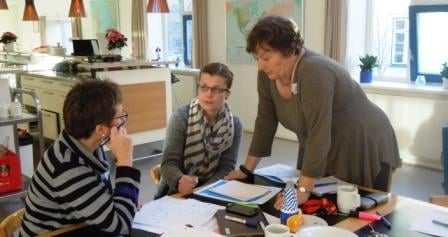DFC Flips Learning
02-03-16
Danida Fellowshop Centre (DFC) has invited five course providers to a series of workshops to get new ideas for redesigning courses.
By Kamilla Frimodt Madsen, Capacity Development Advisor
As part of the action plan for the Danida Capacity Development Support Programme, a selected number of courses will feature new learning approaches, e.g. Flipped Learning, in 2016.
Flipped Learning is a pedagogical approach where parts of the content, that is usually presented by a trainer in the traditional classroom, is made available prior to the training. Learners will be introduced to new theory and new methods individually before starting training.
When joining the training with other learners, the new theory and methods will be used, discussed and reflected upon, leaving more time and space to consolidate the learning.
This specific approach calls for new ways of organizing the learning environment. Some examples could be collaborative methods, peer-to-peer dialogues where trainers become facilitators and learners become important peers to one another in the learning process.
High Impact Learning
At DFC, we consider it to be very important, that course participants learn new things which is linked to and implemented as part of their tasks at work. The purpose of the courses is to support the participants to become change agents at their workplaces.
In order to enhance learning, both on an individual level, and on an organizational level, five course providers will now introduce Flipped Learning in their courses. This is one of DFC’s actions taken to improve High Impact Learning. When striving for High Impact Learning in the didactical design, the time before and after the training are just as important as the face-to-face time actually spent on a course. A clear connection between strategic learning and everyday life at the workplace is also important to include in the didactical design.
Five courses are selected for the Flipped Learning Project, among them Public Private Partnership and Addressing Climate Change in a Development Context.
The idea is to implement Flipped Learning in very different types of courses. With the experiences from the Flipped Learning pilot projects, DFC plans to recommend some of the designs to other courses in the future.
Course providers inspire one another
To get inspiration for Flipped Learning Ms. Zakia Elvang from Spark Copenhagen, has facilitated two workshops at DFC for the course providers and DFC staff.
Many new ideas on how to implement Flipped Learning has been presented by Zakia. One idea is to integrate the use of mobile phones in the DFC courses e.g. using the Socrative Teacher, which is an app for making simple quizzes and surveys.
Another idea is to make a ‘pocket movie’. By using very simple technology, trainers can make videos and introduce new theory and methods, and learners can make videos where they present new knowledge to their peers – It is when you teach others you learn the most. The specific content for the videos could be the content that learners usually find difficult.
During the workshop, some pretty innovative pocket movies were produced and shown at the end of the day accompanied by big applause.
Before and after the course
Other ideas and reflections were shared. One course provider is very keen on the peer-to-peer aspect and wanted to elaborate on the idea of having participants preparing small videos, where they present themselves, their workplace and the key challenges they are facing in their work with reference to the upcoming course theme.
Another reflection is how to keep in touch with the participants after they have returned to their workplace.
During the next four months, the Flipped Learning pilot project will be implemented and evaluated, and we will bring more news on this matter at a later occasion.
Go back to our stories
